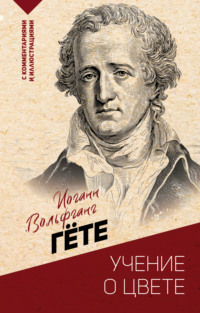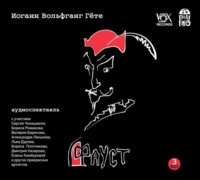Iphigenia in Tauris
 полная версия
полная версияIphigenia in Tauris
Настройки чтения
Размер шрифта
Высота строк
Поля
SCENE II
IPHIGENIA. ARKASARKASPriestess, with speed conclude the sacrifice,Impatiently the king and people wait.IPHIGENIAI had perform'd my duty and thy will,Had not an unforeseen impedimentThe execution of my purpose thwarted.ARKASWhat is it that obstructs the king's commands?IPHIGENIAChance, which from mortals will not brook control.ARKASPossess me with the reason, that with speedI may inform the king, who hath decreedThe death of both.IPHIGENIAThe gods have not decreed it.The elder of these men doth bear the guiltOf kindred murder; on his steps attendThe dread Eumenides. They seiz'd their preyWithin the inner fane, polluting thusThe holy sanctuary. I hasten now,Together with my virgin-train, to batheDiana's image in the sea, and thereWith solemn rites its purity restore.Let none presume our silent march to follow!ARKASThis hindrance to the monarch I'll announce:Do not commence the rite till he permit.IPHIGENIAThe priestess interferes alone in this.ARKASAn incident so strange the king should know.IPHIGENIAHere, nor his counsel nor command avails.ARKASOft are the great consulted out of form.IPHIGENIADo not insist on what I must refuse.ARKASA needful and a just demand refuse not.IPHIGENIAI yield, if thou delay not.ARKASI with speedWill bear these tidings to the camp, and soonAcquaint thee, priestess, with the king's reply.There is a message I would gladly bear him:'Twould quickly banish all perplexity:Thou didst not heed thy faithful friend's advice.IPHIGENIAI willingly have done whate'er I could.ARKASE'en now 'tis not too late to change thy mind.IPHIGENIATo do so is, alas, beyond our power.ARKASWhat thou wouldst shun, thou deem'st impossible.IPHIGENIAThy wish doth make thee deem it possible.ARKASWilt thou so calmly venture everything?IPHIGENIAMy fate I have committed to the gods.ARKASThe gods are wont to save by human means.IPHIGENIABy their appointment everything is done.ARKASBelieve me, all doth now depend on thee.The irritated temper of the kingAlone condemns these men to bitter death.The soldiers from the cruel sacrificeAnd bloody service long have been disused;Nay, many, whom their adverse fortunes castIn foreign regions, there themselves have feltHow godlike to the exil'd wandererThe friendly countenance of man appears.Do not deprive us of thy gentle aid!With ease thou canst thy sacred task fulfil:For nowhere doth benignity, which comesIn human form from heaven, so quickly gainAn empire o'er the heart, as where a race,Gloomy and savage, full of life and power,Without external guidance, and oppress'dWith vague forebodings, bear life's heavy load.IPHIGENIAShake not my spirit, which thou canst not bendAccording to thy will.ARKASWhile there is timeNor labour nor persuasion shall be spar'd.IPHIGENIAThy labour but occasions pain to me;Both are in vain; therefore, I pray, depart.ARKASI summon pain to aid me, 'tis a friendWho counsels wisely.IPHIGENIAThough it shakes my soul,It doth not banish thence my strong repugnance.ARKASCan then a gentle soul repugnance feelFor benefits bestow'd by one so noble?IPHIGENIAYes, when the donor, for those benefits,Instead of gratitude, demands myself.ARKASWho no affection feels doth never wantExcuses. To the king I'll now relateAll that has happen'd. Oh, that in thy soulThou wouldst revolve his noble conduct, priestess,Since thy arrival to the present day!SCENE III
IPHIGENIA, aloneThese words at an unseasonable hourProduce a strong revulsion in my breast;I am alarm'd! – For as the rushing tideIn rapid currents eddies o'er the rocksWhich lie among the sand upon the shore;E'en so a stream of joy o'erwhelm'd my soul.I grasp'd what had appear'd impossible.It was as though another gentle cloudAround me lay, to raise me from the earth,And rock my spirit in the same sweet sleepWhich the kind goddess shed around my brow,What time her circling arm from danger snatch'd me.My brother forcibly engross'd my heart;I listen'd only to his friend's advice;My soul rush'd eagerly to rescue them,And as the mariner with joy surveysThe less'ning breakers of a desert isle,So Tauris lay behind me. But the voiceOf faithful Arkas wakes me from my dream,Reminding me that those whom I forsakeAre also men. Deceit doth now becomeDoubly detested. O my soul, be still!Beginn'st thou now to tremble and to doubt?Thy lonely shelter on the firm-set earthMust thou abandon? and, embark'd once more,At random drift upon tumultuous waves,A stranger to thyself and to the world?SCENE IV
IPHIGENIA. PYLADESPYLADESWhere is she? that my words with speed may tellThe joyful tidings of our near escape!IPHIGENIAOppress'd with gloomy care, I much requireThe certain comfort thou dost promise me.PYLADESThy brother is restor'd! The rocky pathsOf this unconsecrated shore we trodIn friendly converse, while behind us lay,Unmark'd by us, the consecrated grove;And ever with increasing glory shoneThe fire of youth around his noble brow.Courage and hope his glowing eye inspir'd;And his free heart exulted with the joyOf saving thee, his sister, and his friend.IPHIGENIAThe gods shower blessings on thee, Pylades!And from those lips which breathe such welcome news,Be the sad note of anguish never heard!PYLADESI bring yet more, – for Fortune, like a prince,Comes not alone, but well accompanied.Our friends and comrades we have also found.Within a bay they had conceal'd the ship,And mournful sat expectant. They beheldThy brother, and a joyous shout uprais'd,Imploring him to haste the parting hour.Each hand impatient long'd to grasp the oar,While from the shore a gently murmuring breeze,Perceiv'd by all, unfurl'd its wing auspicious.Let us then hasten; guide me to the fane,That I may tread the sanctuary, and seizeWith sacred awe the object of our hopes.I can unaided on my shoulder bearDiana's image: how I long to feelThe precious burden![While speaking the last words, he approachesthe Temple, without perceiving that he is notfollowed by Iphigenia: at length he turns round.]Why thus ling'ring stand.Why art thou silent? wherefore thus confus'd?Doth some new obstacle oppose our bliss?Inform me, hast thou to the king announc'dThe prudent message we agreed upon?IPHIGENIAI have, dear Pylades; yet wilt thou chide.Thy very aspect is a mute reproach.The royal messenger arriv'd, and I,According to thy counsel, fram'd my speech.He seem'd surpris'd, and urgently besought,That to the monarch I should first announceThe rite unusual, and attend his will.I now await the messenger's return.PYLADESDanger again doth hover o'er our heads!O priestess, why neglect to shroud thyselfWithin the veil of sacerdotal rites?IPHIGENIAI never have employ'd them as a veil.PYLADESPure soul! thy scruples will destroy alikeThyself and us. Why did I not foreseeSuch an emergency, and tutor theeThis counsel also wisely to elude?IPHIGENIAChide only me, for mine alone the blame.Yet other answer could I not returnTo him, who strongly and with reason urg'dWhat my own heart acknowledg'd to be right.PYLADESThe danger thickens; but let us be firm,Nor with incautious haste betray ourselves;Calmly await the messenger's return,And then stand fast, whatever his reply:For the appointment of such sacred ritesDoth to the priestess, not the king belong.Should he demand the stranger to beholdWho is by madness heavily oppress'd,Evasively pretend, that in the fane,Securely guarded, thou retain'st us both.Thus you secure us time to fly with speed,Bearing the sacred treasure from this race,Unworthy its possession. Phœbus sendsAuspicious omens, and fulfils his word,Ere we the first conditions have perform'd.Free is Orestes, from the curse absolv'd!Oh, with the freed one, to the rocky isleWhere dwells the god, waft us, propitious gales!Thence to Mycene, that she may revive;That from the ashes of the extinguish'd hearth,The household gods may joyously arise,And beauteous fire illumine their abode!Thy hand from golden censers first shall strewThe fragrant incense. O'er that threshold thouShalt life and blessing once again dispense,The curse atone, and all thy kindred graceWith the fresh bloom of renovated life.IPHIGENIAAs doth the flower revolve to meet the sun,Once more my spirit to sweet comfort turns,Struck by thy words' invigorating ray.How dear the counsel of a present friend,Lacking whose godlike power, the lonely oneIn silence droops! for, lock'd within his breast,Slowly are ripen'd purpose and resolve,Which friendship's genial warmth had soon matur'd.PYLADESFarewell! I haste to re-assure our friends,Who anxiously await us: then with speedI will return, and, hid within the brake,Attend thy signal. – Wherefore, all at once,Doth anxious thought o'ercloud thy brow serene?IPHIGENIAForgive me! As light clouds athwart the sun,So cares and fears float darkling o'er my soul.PYLADESOh, banish fear! With danger it hath form'dA close alliance, – they are constant friends.IPHIGENIAIt is an honest scruple, which forbidsThat I should cunningly deceive the king,And plunder him who was my second sire.PYLADESHim thou dost fly, who would have slain thy brother.IPHIGENIATo me, at least, he hath been ever kind.PYLADESWhat Fate commands is not ingratitude.IPHIGENIAAlas! it still remains ingratitude;Necessity alone can justify it.PYLADESThee, before gods and men it justifies.IPHIGENIABut my own heart is still unsatisfied.PYLADESScruples too rigid are a cloak for pride.IPHIGENIAI cannot argue, I can only feel.PYLADESConscious of right, thou shouldst respect thyself.IPHIGENIAThen only doth the heart know perfect ease,When not a stain pollutes it.PYLADESIn this fanePure hast thou kept thy heart. Life teaches usTo be less strict with others and ourselves;Thou'lt learn the lesson too. So wonderfulIs human nature, and its varied tiesAre so involv'd and complicate, that noneMay hope to keep his inmost spirit pure,And walk without perplexity through life.Nor are we call'd upon to judge ourselves;With circumspection to pursue his path,Is the immediate duty of a man.For seldom can he rightly estimate,Or his past conduct or his present deeds.IPHIGENIAAlmost thou dost persuade me to consent.PYLADESNeeds there persuasion when no choice is granted?To save thyself, thy brother, and a friend,One path presents itself, and canst thou askIf we shall follow it?IPHIGENIAStill let me pause,For such injustice thou couldst not thyselfCalmly return for benefits receiv'd.PYLADESIf we should perish, bitter self-reproach,Forerunner of despair, will be thy portion.It seems thou art not used to suffer much,When, to escape so great calamity,Thou canst refuse to utter one false word.IPHIGENIAOh, that I bore within a manly heart!Which, when it hath conceiv'd a bold resolve,'Gainst every other voice doth close itself.PYLADESIn vain thou dost refuse; with iron handNecessity commands; her stern decreeIs law supreme, to which the gods themselvesMust yield submission. In dread silence rulesThe uncounsell'd sister of eternal fate.What she appoints thee to endure, – endure;What to perform, – perform. The rest thou know'st.Ere long I will return, and then receiveThe seal of safety from thy sacred hand.SCENE V
IPHIGENIA, aloneI must obey him, for I see my friendsBeset with peril. Yet my own sad fateDoth with increasing anguish move my heart.May I no longer feed the silent hopeWhich in my solitude I fondly cherish'd?Shall the dire curse eternally endure?And shall our fated race ne'er rise againWith blessings crown'd? – All mortal things decay!The noblest powers, the purest joys of lifeAt length subside: then wherefore not the curse?And have I vainly hop'd that, guarded here,Secluded from the fortunes of my race,I, with pure heart and hands, some future dayMight cleanse the deep defilement of our house?Scarce was my brother in my circling armsFrom raging madness suddenly restor'd,Scarce had the ship, long pray'd for, near'd the strand,Once more to waft me to my native shores,When unrelenting fate, with iron hand,A double crime enjoins; commanding meTo steal the image, sacred and rever'd,Confided to my care, and him deceiveTo whom I owe my life and destiny.Let not abhorrence spring within my heart!Nor the old Titan's hate, toward you, ye gods,Infix its vulture talons in my breast!Save me, and save your image in my soul!An ancient song comes back upon mine ear —I had forgotten it, and willingly —The Parcæ's song, which horribly they sang,What time, hurl'd headlong from his golden seat,Fell Tantalus. They with their noble friendKeen anguish suffer'd; savage was their breastAnd horrible their song. In days gone by,When we were children, oft our ancient nurseWould sing it to us, and I mark'd it well.Oh, fear the immortals,Ye children of men!Eternal dominionThey hold in their hands.And o'er their wide empireWield absolute sway.Whom they have exaltedLet him fear them most!Around golden tables,On cliffs and clouds restingThe seats are prepar'd.If contest ariseth;The guests are hurl'd headlong,Disgrac'd and dishonour'd,And fetter'd in darkness,Await with vain longing,A juster decree.But in feasts everlasting,Around the gold tablesStill dwell the immortals.From mountain to mountainThey stride; while ascendingFrom fathomless chasms,The breath of the Titans,Half stifl'd with anguish,Like volumes of incenseFumes up to the skies.From races ill-fated,Their aspect joy-bringing,Oft turn the celestials,And shun in the childrenTo gaze on the featuresOnce lov'd and still speakingOf their mighty sire.Thus sternly the Fates sangImmur'd in his dungeon.The banish'd one listens,The song of the Parcæ,His children's doom ponders,And boweth his head.ACT THE FIFTH
SCENE I
THOAS. ARKASARKASI own I am perplex'd, and scarcely know'Gainst whom to point the shaft of my suspicion,Whether the priestess aids the captives' flight,Or they themselves clandestinely contrive it.'Tis rumour'd that the ship which brought them hereIs lurking somewhere in a bay conceal'd.This stranger's madness, these new lustral rites,The specious pretext for delay, exciteMistrust, and call aloud for vigilance.THOASSummon the priestess to attend me here!Then go with speed, and strictly search the shore,From yon projecting land to Dian's grove:Forbear to violate its sacred depths;A watchful ambush set, attack and seize,According to your wont, whome'er ye find.[Arkas retires.SCENE II
THOAS, aloneFierce anger rages in my riven breast,First against her, whom I esteem'd so pure;Then 'gainst myself, whose foolish lenityHath fashion'd her for treason. Man is soonInur'd to slavery, and quickly learnsSubmission, when of freedom quite depriv'd.If she had fallen in the savage handsOf my rude sires, and had their holy rageForborne to slay her, grateful for her life,She would have recogniz'd her destiny.Have shed before the shrine the stranger's blood,And duty nam'd what was necessity.Now my forbearance in her breast alluresAudacious wishes. Vainly I had hop'dTo bind her to me; rather she contrivesTo shape an independent destiny.She won my heart through flattery; and nowThat I oppose her, seeks to gain her endsBy fraud and cunning, and my kindness deemsA worthless and prescriptive property.SCENE III
IPHIGENIA. THOASIPHIGENIAMe hast thou summon'd? wherefore art thou here?THOASWherefore delay the sacrifice? inform me.IPHIGENIAI have acquainted Arkas with the reasons.THOASFrom thee I wish to hear them more at large.IPHIGENIAThe goddess for reflection grants thee time.THOASTo thee this time seems also opportune.IPHIGENIAIf to this cruel deed thy heart is steel'd,Thou shouldst not come! A king who meditatesA deed inhuman, may find slaves enow,Willing for hire to bear one half the curse,And leave the monarch's presence undefil'd.Enwrapt in gloomy clouds he forges death,Whose flaming arrow on his victim's headHis hirelings hurl; while he above the stormRemains untroubl'd, an impassive god.THOASA wild song, priestess, issued from thy lips.IPHIGENIANo priestess, king! but Agamemnon's daughter;While yet unknown, thou didst respect my words:A princess now, – and think'st thou to command meFrom youth I have been tutor'd to obey,My parents first, and then the deity;And thus obeying, ever hath my soulKnown sweetest freedom. But nor then nor nowHave I been taught compliance with the voiceAnd savage mandates of a man.THOASNot I,An ancient law doth claim obedience from thee.IPHIGENIAOur passions eagerly catch hold of lawsWhich they can wield as weapons. But to meAnother law, one far more ancient, speaks,And doth command me to withstand thee, king!That law declaring sacred every stranger.THOASThese men, methinks, lie very near thy heart.When sympathy with them can lead thee thusTo violate discretion's primal law,That those in power should never be provok'd.IPHIGENIASpeaking or silent, thou canst always knowWhat is, and ever must be, in my heart.Doth not remembrance of a common doom,To soft compassion melt the hardest heart?How much more mine! in them I see myself.I trembling kneel'd before the altar once.And solemnly the shade of early deathEnviron'd me. Aloft the knife was rais'dTo pierce my bosom, throbbing with warm life;A dizzy horror overwhelm'd my soul;My eyes grew dim; – I found myself in safety.Are we not bound to render the distress'dThe gracious kindness from the gods receiv'd?Thou know'st we are, and yet wilt thou compel me?THOASObey thine office, priestess, not the king.IPHIGENIASpeaking or silent, thou canst always knowWhat is, and ever must be, in my heart.Doth not remembrance of a common doom,To soft compassion melt the hardest heart?How much more mine! in them I see myself.I trembling kneel'd before the altar once.And solemnly the shade of early deathEnviron'd me. Aloft the knife was rais'dTo pierce my bosom, throbbing with warm life;A dizzy horror overwhelm'd my soul;My eyes grew dim; – I found myself in safety.Are we not bound to render the distress'dThe gracious kindness from the gods receiv'd?Thou know'st we are, and yet wilt thou compel me?THOASI more respect them than a brother's sword.IPHIGENIAUncertain ever is the chance of arms,No prudent warrior doth despise his foe;Nor yet defenceless 'gainst severityHath nature left the weak; she gives him craftAnd wily cunning: artful he delays,Evades, eludes, and finally escapes.Such arms are justified by violence.THOASBut circumspection countervails deceit.IPHIGENIAWhich a pure spirit doth abhor to use.THOASDo not incautiously condemn thyself.IPHIGENIAOh, couldst thou see the struggle of my soul,Courageously to ward the first attackOf an unhappy doom, which threatens me!Do I then stand before thee weaponless?Prayer, lovely prayer, fair branch in woman's hand,More potent far than instruments of war,Thou dost thrust back. What now remains for meWherewith my inborn freedom to defend?Must I implore a miracle from heaven?Is there no power within my spirit's depths?THOASExtravagant thy interest in the fateOf these two strangers. Tell me who they are,For whom thy heart is thus so deeply mov'd.IPHIGENIAThey are – they seem at least – I think them Greeks.THOASThy countrymen; no doubt they have renew'dThe pleasing picture of return.IPHIGENIA, after a pauseDoth manLay undisputed claim to noble deeds?Doth he alone to his heroic breastClasp the impossible? What call we great?What deeds, though oft narrated, still upliftWith shudd'ring horror the narrator's soul,But those which, with improbable success,The valiant have attempted? Shall the manWho all alone steals on his foes by night,And raging like an unexpected fire,Destroys the slumbering host, and press'd at lengthBy rous'd opponents or his foemen's steeds,Retreats with booty – be alone extoll'd?Or he who, scorning safety, boldly roamsThrough woods and dreary wilds, to scour the landOf thieves and robbers? Is nought left for us?Must gentle woman quite forego her nature, —Force against force employ, – like Amazons,Usurp the sword from man, and bloodilyRevenge oppression? In my heart I feelThe stirrings of a noble enterprize;But if I fail – severe reproach, alas!And bitter misery will be my doom.Thus on my knees I supplicate the gods.Oh, are ye truthful, as men say ye are,Now prove it by your countenance and aid;Honour the truth in me! Attend, O king!A secret plot is laid; 'tis vain to askTouching the captives; they are gone, and seekTheir comrades who await them on the shore.The eldest, – he whom madness lately seiz'd,And who is now recover'd, – is Orestes,My brother, and the other Pylades,His early friend and faithful confidant.From Delphi, Phœbus sent them to this shoreWith a divine command to steal awayThe image of Diana, and to himBear back the sister, promising for thisRedemption to the blood-stain'd matricide.I have deliver'd now into thy handsThe remnants of the house of Tantalus.Destroy us – if thou canst.THOASAnd dost thou thinkThe savage Scythian will attend the voiceOf truth and of humanity, unheardBy the Greek Atreus?IPHIGENIA'Tis heard by all,Whate'er may be their clime, within whose breastFlows pure and free the gushing stream of life. —What silent purpose broods within thy soul?Is it destruction? Let me perish first!For now, deliv'rance hopeless, I perceiveThe dreadful peril into which I haveWith rash precipitancy plung'd my friends.Alas! I soon shall see them bound before me!How to my brother shall I say farewell?I, the unhappy author of his death.Ne'er can I gaze again in his dear eyes!THOASThe traitors have contriv'd a cunning web,And cast it round thee, who, secluded long,Giv'st willing credence to thine own desires.IPHIGENIANo, no! I'd pledge my life these men are true.And shouldst thou find them otherwise, O king,Then let them perish both, and cast me forth,That on some rock-girt island's dreary shoreI may atone my folly. Are they true,And is this man indeed my dear Orestes,My brother, long implor'd, – release us both,And o'er us stretch the kind protecting arm,Which long hath shelter'd me. My noble sireFell through his consort's guilt, – she by her son;On him alone the hope of Atreus' raceDoth now repose. Oh, with pure heart and handsLet me depart to expiate our house.Yes, thou wilt keep thy promise; thou didst swear,That were a safe return provided me,I should be free to go. The hour is come.A king doth never grant like common men,Merely to gain a respite from petition;Nor promise what he hopes will ne'er be claim'd.Then first he feels his dignity completeWhen he can make the long-expecting happy.THOASAs fire opposes water, and doth seekWith hissing rage to overcome its foe,So doth my anger strive against thy words.IPHIGENIALet mercy, like the consecrated flameOf silent sacrifice, encircl'd roundWith songs of gratitude, and joy, and praise,Above the tumult gently rise to heaven.THOASHow often hath this voice assuag'd my soul!IPHIGENIAExtend thy hand to me in sign of peace.THOASLarge thy demand within so short a time.IPHIGENIABeneficence doth no reflection need.THOAS'Tis needed oft, for evil springs from good.IPHIGENIA'Tis doubt which good doth oft to evil turn.Consider not: act as thy feelings prompt thee.SCENE IV
ORESTES (armed). IPHIGENIA. THOASORESTES, addressing his followersRedouble your exertions! hold them back!Few moments will suffice; retain your ground,And keep a passage open to the shipFor me and for my sister. To IPHIGENIA, without perceiving THOASCome with speed!We are betray'd, – brief time remains for flight.THOASNone in my presence with impunityHis naked weapon wears.IPHIGENIADo not profaneDiana's sanctuary with rage and blood.Command your people to forbear awhile,And listen to the priestess, to the sister.ORESTESSay, who is he that threatens us?IPHIGENIAIn himRevere the king, who was my second father.Forgive me, brother, that my childlike heartHath plac'd our fate thus wholly in his hands.I have betray'd your meditated flight,And thus from treachery redeem'd my soul.ORESTESWill he permit our peaceable return?IPHIGENIAThy gleaming sword forbids me to reply.ORESTES, sheathing his swordThen speak! thou seest I listen to thy words.SCENE V
ORESTES. IPHIGENIA. THOAS Enter PYLADES, soon after him ARKAS, both with drawn swordsPYLADESDo not delay! our friends are putting forthTheir final strength, and yielding step by step,Are slowly driven backward to the sea. —A conference of princes find I here?Is this the sacred person of the king?ARKASCalmly, as doth become thee, thou dost stand,O king, surrounded by thine enemies.Soon their temerity shall be chastis'd;Their yielding followers fly. – their ship is ours.Speak but the word, and it is wrapt in flames.THOASGo, and command my people to forbear!Let none annoy the foe while we confer. (Arkas retires.)ORESTESI willingly consent. Go, Pylades!Collect the remnant of our friends, and waitThe appointed issue of our enterprize.(Pylades retires.)








